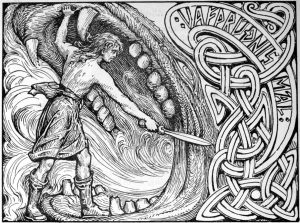The Wolf in a Tower Time Oracle
Like many mornings during this period of time many call Tower Time, I woke up to a message from a friend about “weird shit.” My friend was asking me if I’d seen John Beckett’s most recent blog post. You may have already seen it as it’s doing the rounds. But in case you haven’t, it’s about an oracular ritual during the Mystic South conference and the messages received by some of the participants.
I’m going to be honest here: None of these messages are particularly surprising to me. If anything, much of it tallies with what I’ve been getting from other sources.
But there’s one message in particular that I want to focus on today. It’s the message that there must be joy or “Fenris will eat the world.”

Wolves and Greed
On the surface, Bergrune’s message (an oracle I know personally) may sound simplistic and strange. But I’ve found myself turning it over and over in my mind. This past weekend I taught the second in a two-part series of classes about Animistic Heathenry and magic in which greed was a major talking point. This message dovetails nicely with my current meditations on how best to deal with greed.
In her book The Seed of Yggdrasill, Maria Kvilhaug points out that wolves are associated with greed in the ON sources. This is something Snorri is quite clear on in Skáldskaparmál, the text in which he teaches the art of writing and understanding the language of poetry.
“But these things have now to be told to young poets who desire to learn the language of poetry and to furnish themselves with a wide vocabulary using traditional terms; or else they desire to be able to understand what is expressed obscurely.”
Sturluson, Snorri. Skáldskaparmál (Faulkes trans.). p. 64.
Those of you who are already familiar with Norse mythology will probably already know the names of Óðins wolves: Geri and Freki. Both names are words that mean “greed,” and both names can be used as common nouns for “wolf” in skaldic poetry (Sturluson. 135, 164). Along similar lines, it was also considered normal to refer to wolves in relation to blood and corpses as their food and drink (Sturluson 135).
The Meanings in the Myth
From Maria Kvilhaug’s perspective (which I share), the ON myths are not simply stories of gods and other beings. They contain true wisdom if you know how to look for it. Kvilhaug is someone who’s learned how to look for it. And if we listen to her, we can learn to look for it too.
Bergrune’s message mentioned Fenrir, which inescapably leads us to the Ragnarök myth – an appropriate choice in our collapsing world.
So, what wisdom can we find in the myth of Ragnarök? What lesson can we take from this?
To me, the battle between this soul-giving deity – one of our creators even – and greed indicates that this isn’t only a battle for gods. It is a battle that we humans face too.
The Nature of Greed
Binding the Wolf
Binding the Wolf and the River of Hope
The final chain was, Gleipnir, or “Open One,” a silk-like binding that they used to bind the wolf to a giant stone slab on an island. At first glance, this is reminiscent of an oubliette. This island is not only a place to bind a potential future danger, but to forget about it as well. But we’re not yet done here, because Fenrir reacted violently and tried to bite them. From his perspective, this was likely a grave betrayal; after all, they were his foster family, and that meant a lot back then.

In response to his lashing out, the gods stabbed him through the roof of his mouth with a sword. A clear foreshadowing of the final doom he would meet at Viðarr’s hand. Then, they left him howling in pain and drooling. We’re told his saliva forms a river called “Hope” (Sturluson. 29).
As always, hope is often the only thing to continue flowing when we’re otherwise trapped and/or in pain.
Of course, those bindings didn’t work either in the long run. If anything, I’d argue those actions only made everything worse. As with all prophecies, you run the risk of fulfilling them yourself if you’re not careful – something that becomes especially likely the more afraid you are.
No. Best to ignore it.
Remember, kids: Don’t look up!
But What of Joy?
Domesticating the Wolf
Over the millennia, they’ve helped us to get food and stay safe. They’ve been our companions, workers, family members, protectors, and friends. Those wolves contributed immeasurably to the success of our species and eventually became dogs.


